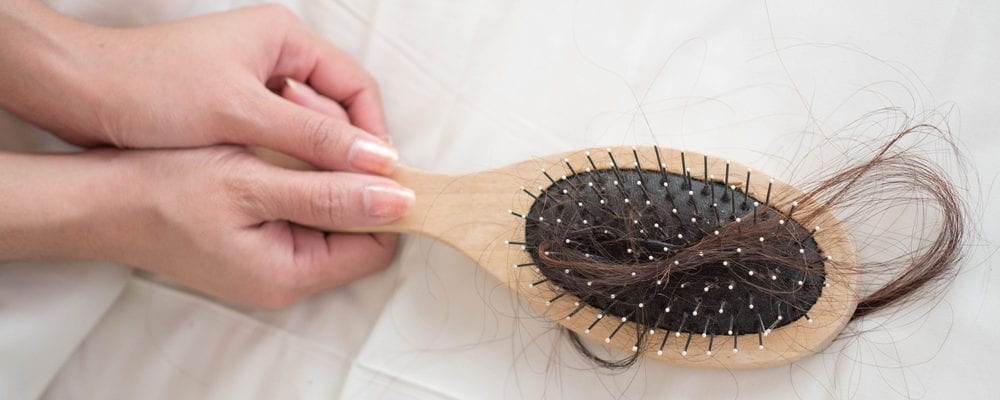
Hair Loss After Weight Loss Surgery – Preventive Tips [GUIDE]
One of the most common questions that we get from patients before undergoing gastric sleeve surgery is, “Will I have hair loss after weight loss surgery?”
The short answer is maybe, but it will only be temporary.
Table of Contents:
Last Updated on April 24, 2024
Hair loss after weight loss surgery, particularly metabolic and bariatric surgery (MBS), is a recognized complication that many patients experience. While it can be alarming, understanding the reasons behind it and the preventive measures can help alleviate concerns.
Key Takeaways – Hair Loss after Bariatric Surgery
- Hair loss post-surgery is a temporary side effect and typically starts 3-4 months after surgery.
- The main cause is a drop in calorie intake, leading to a shift in the hair growth cycle.
- Nutritional deficiencies, especially in protein, iron, and zinc, can exacerbate hair loss.
- Hair loss after bariatric surgery is called telogen effluvium, a temporary condition where hair follicles go into a resting phase.
- It’s a reaction to a sudden reduction in calorie intake.
- Between 5-15% of hair enters the telogen phase, and shedding occurs 3-6 months after surgery.
- Hair usually grows back within 6 months to a year.
- Stress and major surgery can also trigger hair loss.
- A systematic review and meta-analysis found the incidence of hair loss post-MBS to be approximately 57%.
- Hair loss was more common in younger women.
- Lower zinc concentration was observed in patients with hair loss.
- No significant differences in serum iron levels between patients with or without hair loss, but ferritin levels were generally lower in those with hair loss.
Why Hair Loss Occurs After Bariatric Surgery

Hair shedding is typically encountered between 3 to 6 months following bariatric surgery. It is believed to result in part from a higher than normal amount of hair follicles entering a dormant state. The medical term for this is “telogen effluvium”. The condition can be seen in a host of other settings as well including, childbirth, severe emotional distress, and other major surgeries. In fact, hair loss is even encountered even when someone loses a significant amount of weight through dieting alone.
The good news is that hair loss after weight loss surgery rarely lasts more than 6 to 12 months and generally does not require any action unless other underlying causes are suspected. This type of hair loss does not lead to baldness and normal growth will eventually return. The bad news is that there’s no proven way to prevent this hair shedding from occurring in the first place.
A systematic review and meta-analysis on hair loss after MBS revealed that the incidence of hair loss post-surgery was approximately 57%. Interestingly, this incidence decreased with longer follow-up times. It was observed that hair loss was more common in younger women and those with certain nutritional deficiencies.
Key Nutritional Factors
- Zinc: Studies have shown that zinc concentration tends to be lower in patients experiencing hair loss after MBS. Zinc plays a crucial role in hair tissue growth and repair. It also helps keep the oil glands around the follicles working properly. A deficiency can lead to hair loss.
- Iron and Ferritin: While some studies found no significant differences in serum iron levels between patients with or without hair loss, ferritin levels (a stored form of iron) were generally lower in those reporting hair loss. Iron is essential for hair growth. If you’re low on iron, your hair may not get enough oxygen, leading to shedding.
- Folic Acid: Folic acid plays a vital role in hair growth by renewing the cells that aid the growth of hair. A deficiency in folic acid can inhibit the health and growth of hair.
The Role of Age and Gender
Hair loss post-MBS was found to be significantly more common in younger women. This could be attributed to various factors, including hormonal changes, stress, and nutritional deficiencies.
The Psychological Impact
While hair loss post-surgery does not usually result in severe morbidity, it can significantly impact mental health, self-esteem, and the overall quality of life of the patient. It’s essential to address these concerns and provide adequate support and guidance.
When To Be Concerned About Hair Loss?
Although far less common, hair loss can also be a result of nutritional deficiencies after bariatric surgery. You should be suspicious of this possibility if:
- Hair loss persists beyond the first year of surgery
- Hair loss first begins more than six months after surgery
- There are significant ongoing issues maintaining adequate food intake due to severe difficulty swallowing, nausea or vomiting
- Blood testing demonstrates persistently low iron, zinc or protein levels
- Other symptoms of vitamin and/or mineral deficiencies exist
What Can You Do About Hair Loss?
Unfortunately, the mainstay of hair shedding after Vertical Sleeve Gastrectomy (VSG) is simply waiting for this process to run its course. Patients should ensure that their daily intake of protein is 60-80g and that they are consistently taking an appropriate vitamin regimen.
If there is a suspicion of a nutritional deficiency, the patient should be tested thoroughly, particularly for zinc, iron and B12 levels. It is also important to make sure that any suggested multivitamin contains zinc (8-22mg) and copper (1-2mg).
There has been some suggestion that supplementation with daily biotin (2.5mg) and flaxseed oil (15ml) may be beneficial for hair regrowth. While many patients swear by these supplements, there is little research to-date to support this claim.
For severe cases of hair shedding, some physicians recommend prescribing topical minoxidil (ROGAINE®) to maintain hair density and stimulate regrowth. However, there is not much research available to back up this claim either.
Preventive Measures and Tips
- Nutritional Supplements: Ensure you’re getting enough zinc, iron, and folic acid. Consult with your healthcare provider about the right supplements post-surgery.
- Regular Check-ups: Regularly monitor your nutritional levels to catch any deficiencies early.
- Healthy Diet: Incorporate foods rich in the essential nutrients mentioned above. This includes leafy greens, beans, seeds, and meat.
- Stay Informed: Understand that hair loss is a common side effect and usually temporary. Stay informed and seek support when needed.
- Avoid heat styling and harsh hair products.
- Be gentle when brushing and washing hair.
Are you considering weight loss surgery?
Find some answers on whether you qualify by completing our Qualification Questionnaire and reading our latest blog post “Do I Qualify For Weight Loss Surgery?“.
Our team at The Sleeve Clinic, one of the top rated weight loss clinic in Toronto and Mississauga is dedicated to providing comprehensive care and support throughout your weight loss journey. Dr. Gmora is one of the highest-rated bariatric surgeons in Ontario according to RateMDs.
For more insights and personalized advice, don’t hesitate to reach out to us. Let’s take the first step towards your healthier future together. Click here to contact us today.






